四川省宜宾市第三中学2016-2017学年高一3月月考英语试题
- 格式:doc
- 大小:92.50 KB
- 文档页数:12

2016-2017学年第一学期第三次月考七年级英语(笔试部分)第二部分笔试部分二、单项选择(15小题,每小题1分,共15分)从A、B、C、D四个选项中选出一个最佳答案,并将其标号填入题前括号内。
( )21. My brother wants ____ orange, not ____ orange juice.A. an; /B. an; anC. a; /D. a; a ( )22. Miss Wang teaches ____ English. We all like ____.A.we; sheB. we; herC. our; herD. us; her( )23. —Do you have _____ bread?—Sorry, I don’t have _______, but I have ______ hamburgers.A. any, any, someB. some, some, someC. any, some, someD. any, any, any( )24. —How many ____ would you like?—Two, please.A. glasses milkB. glass of milksC. glasses of miD. glasses of milks ( )25. —________ go to the zoo tomorrow?—Good idea.A. Would you likeB. How aboutC. Why notD.What about( )26. —____ do you like China?—It’s very n ice.A. WhatB. WhereC.WhoD. How( )27. —What would you like ____?—A glass of water, please.A. drinkB. haveC. to drinkD. to eat( )28. I like _____ very much, my mother often cooks it for me.A. breadB. vegetablesC. fishD. eggs( )29. —_______ is your mother?—A nurse. She works in a hospital.A. WhoB. WhatC. HowD. Where( )30. —I like these shoes. Can I ____?—Sure.A. try them onB.try it onC. try on itD. try on them ( )31. Does your father often help you ____your Chinese?A. onB. forC. ofD. with( )32. —____, Tom. Is this your book?—No, it isn’t. I think it’s ____.A. Excuse me; JackB. Sorry;Jack’sC. Excuse me; Jack’sD. Sorry; Jack( )33. —____ your sister know Tom?—No, she ____.A. Do; don’tB. Does; doesn’tC. Do; doD. Does; does( )34. —Is that girl Kate Green?—Yes, ____.A. you’re rightB. that’s OKC. he isD. she isn’t( )35. —Hi, Lucy. Your skirt is very nice.—____A. Yes, it’s nice.B. That’s OK.C. You’re right.D. Thank you.三、完形填空(10小题,每小题1分,共10分)先通读短文,掌握其大意,然后从A、B、C、D四个选项中选出一个可以填入相应空白处的最佳答案,并将其标号填入题前括号内。

四川省宜宾第三中学2021-2021学年高一英语3月月考试题〔无答案〕第一局部听力〔共两节,总分值30分〕第一节〔共5小题;每题分,总分值分〕听下面5段对话。
每段对话后有一个小题,从题中所给的A、B、C三个选项中选出最正确选项。
听完每段对话后,你都有10秒钟的时间来答复有关小题和阅读下一小题。
每段对话仅读一遍。
.Whatdayisittoday?A.Sunday.B.Wednesday.C.Thur sday..WhatcolordoesTomprobablylike?A.Blue.B.Red.C.Whit e..WhounderstandsChinese?A.Theman.B.Thewoman.C.Mary.Whatarethespeakerstalkingabout?Thedifficultyofthedrivingexam.Wheretotakethedrivingexam.Howlongtheywillwaitfortheexam.Howmanyeggsdoesthemanneedforthesmallcake?A.Five.B.Ten.C.Fifteen.第二节〔共15小题;每题分,总分值分〕听下面5段对话或独白。
每段对话或独白后有几个小题,从题中所给的A、B、C三个选项中选出最正确选项。
听每段对话或独白前,你将有时间阅读各个小题,每题5秒钟;听完后,各小题将给出5秒钟的作答时间。
每段对话或独白读两遍。
听第6段材料,答复第6、7题。
6.Whatisthemanaskingfor?A.Ashirt.B.Askirt.C.Adryer.Whatwillthemandolater?Haveameeting.Haveajobinterview.A.Checktheroominthehotel.-1-听第7段材料,答复第8、9题。
8.Whereisthemangoing?A.Miami.B.Dallas.C.Thailand. Whatsuggestiondoesthewomanprovide?GoingtoDallasalone.Cancelingtheflight.Packingupasmallerluggage.听第8段材料,答复第10至12题。

高2014级高二下期6月月考试题英语时间:120分钟总分:150分本试卷分第Ⅰ卷(选择题)和第Ⅱ卷(非选择题)两部分。
第Ⅰ卷注意事项:1. 答第Ⅰ卷前,考生务必将自己的姓名、准考证号填写在答题卡上。
2. 选出每小题答案后,用铅笔把答题卡上对应题目的答案标号涂黑。
如需改动,用橡皮擦干净后,再选涂其他答案标号。
不能答在本试卷上,否则无效。
第一部分听力(共两节,满分30分)做题时,先将答案标在试卷上。
录音内容结束后,你将有两分钟的时间将试卷上的答案转涂到答题卡上。
第一节(共5 小题;每小题1.5分,共7.5分)听下面5段对话。
每段对话后有一个小题,从题中所给的A、B、C三个选项中选出最佳选项,并标在试卷的相应位置。
听完每段对话后,你都有10秒钟的时间来回答有关小题和阅读下一小题。
每段对话仅读一遍。
1. How long did it take the man to finish his paper?A. Less than 75 minutes.B. Less than 100 minutes.C. Almost 150 minutes.2. Where does the man usually eat?A. At home.B. In his office.C. At a restaurant.3. Which country does the man want to know about?A. Australia.B. America.C. Canada.4. What can we learn from the conversation?A. The woman lost her way.B. The woman lost her keys.C. The woman lost her car.5. Who will pay the telephone bill?A. The man.B. The woman.C. Mary.第二节(共15题;每小题1.5分,满分22.5分)听下面5段对话或独白。

宜宾市三中2013级高三上期10月月考英语试题考试时间:120分钟全卷满分:150分本试卷分第Ⅰ卷(选择题)和第Ⅱ卷(非选择题)两部分。
第Ⅰ卷注意事项:1. 答第Ⅰ卷前,考生务必将自己的姓名、准考证号填写在答题卡上。
2. 选出每小题答案后,用铅笔把答题卡上对应题目的答案标号涂黑。
如需改动,用橡皮擦干净后,再选涂其他答案标号。
不能答在本试卷上,否则无效。
第一部分听力(共两节,满分30分)做题时,先将答案标在试卷上。
录音内容结束后,你将有两分钟的时间将试卷上的答案转涂到答题卡上。
第一节(共5 小题;每小题1.5分,共7.5分)听下面5段对话。
每段对话后有一个小题,从题中所给的A、B、C三个选项中选出最佳选项,并标在试卷的相应位置。
听完每段对话后,你都有10秒钟的时间来回答有关小题和阅读下一小题。
每段对话仅读一遍。
1.What is the woman’s new teacher like?A. Tall and handsome.B. Pretty and kind.C. Tall and beautiful..2.What is the most probable relationship between the two speakers?A. Interviewer and interviewee.B. Teacher and student.C. Doctor and patient..3.Where does the conversation most probably take place?A. In a bookshop.B. In a reading room.C. In a library.4.What can we know from the conversation?A. The woman doesn’t like orange juice.B. The man was looking for orange juice.C. The man broke the container of juice.5. How much does a pen cost?A. One dollar.B. Two dollars.C. Three dollars.第二节(共15小题;每小题1.5分,满分22.5分)听下面5段对话或独白。

四川省宜宾第三中学2015-2016学年⾼⼀英语1⽉⽉考试题宜宾市三中2015级⾼⼀(上)1⽉⽉考试题英语第Ⅰ卷第⼀部分:听⼒(共两节,满分30分)第⼀节:(共5⼩题;每⼩题1.5分,满分7.5分)请听下⾯5段对话,选出最佳选项。
1.Where is Katie probably now?A.At home.B. On her way.C. In a car shop.2.What is the woman worried about?A.Her books.B. Her friend Lisa.C. Her new dormitory.3.Which sport does the man like the best?A.Football.B. Volleyball.C. Tennis.4.What does the man probably want to be?A.An actor.B. An athlete.C. A scientist.5.Why didn’t Mary sleep well?A.She had a headache.B.She had a stomachache.C.She was troubled by the noise.第⼆节:(共15⼩题;每⼩题1.5分,满分22.5分)请听下⾯5段对话或独⽩,选出最佳选项。
请听第6段材料,回答第6、7题。
6.Where will the woman go for her holiday?A.Dalian.B. Lijiang.C. Dali.7.How will the woman travel there?A.By air.B. By Train.C. By car.请听第7段材料,回答第8、9题。
8.What does the man think of Tina?/doc/84a9c86ff121dd36a22d8258.html zy.B. Forgetful.C. Careless.9.What happened to the man’s notes?A.Alice lost them.B. Tina lost them.C. Lily lost them.请听第8段材料,回答第10⾄12题。

高2015级高二下期半期考试题英语全卷满分:150分考试时间:120分钟本试卷分第I 卷(选择题)和第II 卷(非选择题)两部分。
第一部分听力(共两节,满分30分)第一节(共5小题;每小题1.5分,满分7.5分)请听下面5段对话。
每段对话后有一个小题,从题中所给的A.B.C三个选项中选出最佳选项,并标在试卷的相应位置。
听完每段对话后,你都有10秒钟的时间来回答有关小题和阅读下一小题。
每段对话仅读一遍。
1.What are the two speakers mainly talking about?A. The TV news.B. Going hiking.C. The weather.2. How much does one ticket cost?A. $2.40B. $ 4.40C. $8.803. Where will the woman go this evening?A. Her sister’s.B. The station.C. The theater.4. What sport does the man like best?A. Basketball.B. Football.C. Tennis.5. What does the man think of the book?A. Too bad.B. Worth reading.C. Not good enough.第二节(共15小题;每小题1.5分,满分22.5分)听下面5段对话或独白,每段对话或独白后有几个小题,从题中所给的A.B.C三个选项中选出最佳选项,并标在试卷的相应位置。
听每段对话或独白前,你将有时间阅读各个小题,每小题5秒钟。
听完后,各小题给出5秒钟的作答时间。
每段对话或独白读两遍。
请听第6段材料,回答6.7题。
6. Where does the conversation probably take place?A. In a hospital.B. At the accident spot.C. At the woman’s home.7. What can we know about the woman?A. Her car broke down halfway.B. She was nearly killed by the tree.C. She was injured in an accident.请听第7段材料,回答8.9题。

高2016级高二上期第二次月考试题英语(考试时间:120分钟;满分:150分)本试卷分第Ⅰ卷(选择题)和第Ⅱ卷(非选择题)两部分。
第Ⅰ卷第一部分听力(共两节,满分30分)第一节(共5个小题;每小题1.5分,满分7.5分)听下面5段对话。
每段对话后有一个小题,从每题所给的A、B、C三个选项中选出最佳选项,并标在试卷的相应位置。
听完每段对话后,你都有10秒钟的时间来回答有关小题和阅读下一小题。
每段对话仅读一遍。
1. Where is the bike?A. At the gate.B. In the garden.C. Under the stairs.2. Why did the woman fail the test?A. She got all the answers wrong.B. She left the test sheet blank.C. She wrote the answers in the wrong place.3. What does the man think of the coffee?A. It tastes strange.B. It gives him a lot of energy.C. It’s just like regular coffee.4. What are the speakers doing?A. Practicing a play.B. Taking a walk downtown.C. Filming a movie scene.5. What can we learn about the woman?A. She isn’t a local.B. She is trying to park her car.C. She didn’t see the sign.第二节(共15个小题;每小题1.5分,满分22.5分)听下面5段对话或独白。
每段对话或独白后有几个小题,从题中所给的A、B、C三个选项中选出最佳选项,并标在试卷的相应位置。

高2016级第一期10月阶段性考试英语试题I、听力(每小题1分,满分20分。
请将答案涂在答题卡上对应位置。
)第一节听下面5段对话。
每段对话后有一个小题,从题中所给的A、B、C三个选项中选出最佳选项,并标在试卷的相应位置。
听完每段对话后,你都有l0秒钟的时间来回答有关小题和阅读下一小题。
每段对话仅读一遍。
1. What does the woman want to do with the letter?A. Apply for a fashion job.B. Apply for a fashion school.C. Work for a magazine.2. Why is the woman upset?A. She doesn't like concerts.B. She didn't hear her favorite song.C. She doesn't like that band.3. How can the woman get to the post office?A. Go left, then right.B. Go straight, then right.C. Go right, then straight.4. Where might the woman's old house be?A. On the East Coast.B. On the West Coast.C. In Southern Europe.5. When does the man suggest seeing a movie?A. On Wednesday evening.B. On Sunday morning.C. On Saturday afternoon.第二节听下面5段对话或独白。
每段对话或独白后有几个小题,从题中所给的A、B、C三个选项中选出最佳选项,并标在试卷的相应位置。

高2016级高一下期3月月考试题英语(本试卷满分150分 120分钟完成)第Ⅰ卷第一部分听力(共两节,满分30分)做题时,先将答案标在试卷上。
录音内容结束后,你将有两分钟的时间将试卷上的答案转涂到答题卡上。
第一节(共5小题;每小题1.5分,满分7.5分)听下面5段对话,每段对话后有一个小题。
从题中所给的A,B,C三个选项中选出最佳选项,并标在试卷的相应位置。
听完每段对话后,你都有10秒钟的时间来回答有关小题和阅读下一小题。
每段对话仅读一遍。
1. What does the woman think about her mother ?A。
Kind—hearted. B。
Critical. C. Tireless。
2。
What are the speakers going to do probably?A。
Eat breakfast。
B。
Walk around the town.C。
Work in the restaurant。
3. Why did the man come to Los Angles?A。
He grew up there。
B。
His father worked there.C。
He went to college there.4。
What does the woman ask the man to do?A。
Have fun on the beach。
B. Throw away the garbage。
C。
Do community work。
5. What’s the possible relationship between the speakers?A. Husband and wife. B。
Co-workers. C. Friends.第二节(共15小题;每小题1。
5分,满分22 .5分)听下面5段对话或独自。
每段对话或独白后有几个小题,从题中所给的A、B、C三个选项中选出最佳选项,并标在试卷的相应位置。

四川省宜宾市一中高2015级2015-2016学年下期第3周英语试题命题人:莫莉审题人:廖琪一. 单项填空(共20小题;每小题1分,满分20分)1.There’s no ink in the bottle, because all the ink _____.A. was used upB. has been used upC. was usedD. has been used 2._____ that a new road _____ in front of our building soon.A. It is said, will be builtB. We say, was builtC. It was said, has been builtD. He says, was going to build 3.Percent of the land here _____ rice fields.A. have turned intoB. has been turnedC. have been turnedD. has been turned into 4.What kind of information _____ to you?A. has givenB. has been givenC. was he givenD. he has given 5.The soldier _____ in the fighting.A. got hurtB. hurtC. hurtsD. has hurt 6.Please show me another. This cup _____.A. is brokenB. was brokenC. has brokenD. is breaking 7.This novel _____ well.A. sellsB. is soldC. will be soldD. has been sold 8.—This cloth _____ well and _____ long.—OK, I’ll take it.A. washes, lastsB. is washed, lastedC. washes, is lastedD. is washing, lasting 9.I wonder how long ago the accident _____.A. takes placeB. have taken placeC. had taken placeD. took place 10.How sweet the music _____!A. sounds to beB. is soundedC. is sounded to beD. sounds 11.—Have you moved into the new house?—Not yet. The rooms _____.A. are being paintedB. are paintingC. are paintedD. are being painting12.If city noises _____ from increasing, people _____ shout to be heard even at the dinner table 20 years from now.A. are not kept, will have toB. are not kept, have toC. do not keep, will have toD. do not keep, have to13.In some parts of the world, tea _____ with milk and sugar.A. is servingB. is servedC. servesD. served14.I need one more stamp before my collection _____.A. has completedB. CompletesC. has been completedD. is completed15.---_____ the sports meet might be put off.---Yes, it all depends on the weather.A. I’ve been told.B. I’ve toldC. I’m toldD. I told16.Cleaning women in big cities usually get _____ by the hour.A. payB. payingC. paidD. to pay17.Visitors _____ not to touch the exhibits.A. will requestB. requestC. are requestingD. are requested18.In order to prevent the fire preventing, some of the houses nearby _________before the firemen arrived.A. were pulled downB. had been pulled downC. have been pulled downD. had pulled down19.The police found that the house _____ and a lot of things _____.A. has broken into, has been stolenB. had broken into, had been stolenC. has been broken into, stolenD. had been broken into, stolen20.When he came in, the guests _____ and _____ for the concert.A. all seated, waitingB. all seated, waitedC. were all seated, waitingD. were all seating, waiting二.阅读理解(共4小题;每小题2 分,满分8 分)Do you like chocolate? Maybe most people do. A box of it can be a great gift. Buy one for a friend and give it as a surprise. See how happy that person gets.Say you just got a box of chocolate. Which piece do you pick first? A man has studied people’s choices. He says they tell something about the person. Did you choose a round piece?You are a person who likes to party. Did you choose an oval (椭圆形的) shape? You are a person who likes to make things. Picking a square shape shows something else. The person is honest and truthful. You can depend on him or her.What kind of chocolate do you pick? Maybe you like milk chocolate. This shows you have warm feelings about the past. Dark chocolate means something else. A person who chooses it looks toward the future. What about white chocolate? Would you choose it? If so, you may find it hard to make up your mind. Some people like chocolate with nuts. These are people who like to help others.Do you believe these ideas? Can candy tell all these things? It doesn’t really matter. There is one sure thing about eaters of chocolate. They eat it because they like it.21. This passage mainly tells us ______.A. why people like chocolateB. how to buy a box of chocolate which people likeC. different choices may show different charactersD. about different kinds of chocolate22. Picking a round shape of chocolate shows that a person ______.A. can be depended onB. likes singing, dancing and drinkingC. is good at making thingsD. likes to do something for others23. From this passage we can say that a helpful man may choose chocolate ______.A. with coffeeB. with nutsC. in square shapeD. in oval shape24. The last paragraph shows that the writer ______.A. believes all the information about chocolateB. does not believe the information about candy at allC. is trying to get you to believe the information about chocolateD. doesn’t think it important whether you believe the ideas三.语法填空(共10小题;每小题1.5分,满分15 分)阅读下面材料,在空白处填入适当的内容(不多于1个单词)或括号内单词的正确形式。
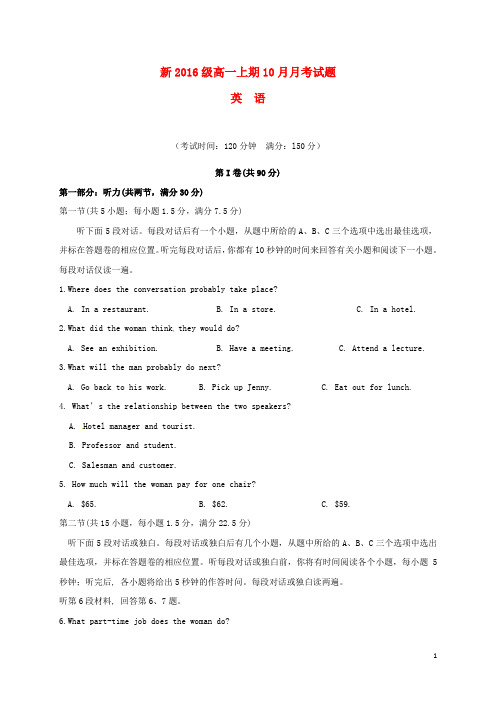
新2016级高一上期10月月考试题英语(考试时间:120分钟满分:l50分)第I卷(共90分)第一部分:听力(共两节,满分30分)第一节(共5小题;每小题1.5分,满分7.5分)听下面5段对话。
每段对话后有一个小题,从题中所给的A、B、C三个选项中选出最佳选项,并标在答题卷的相应位置。
听完每段对话后,你都有l0秒钟的时间来回答有关小题和阅读下一小题。
每段对话仅读一遍。
1.Where does the conversation probably take place?A. In a restaurant.B. In a store.C. In a hotel.2.What did the woman think they would do?A. See an exhibition.B. Have a meeting.C. Attend a lecture.3.What will the man probably do next?A. Go back to his work.B. Pick up Jenny.C. Eat out for lunch.4. What’s the relationship between the two speakers?A. Hotel manager and tourist.B. Professor and student.C. Salesman and customer.5. How much will the woman pay for one chair?A. $65.B. $62.C. $59.第二节(共15小题,每小题1.5分,满分22.5分)听下面5段对话或独白。
每段对话或独白后有几个小题,从题中所给的A、B、C三个选项中选出最佳选项,并标在答题卷的相应位置。
听每段对话或独白前,你将有时间阅读各个小题,每小题5秒钟;听完后, 各小题将给出5秒钟的作答时问。
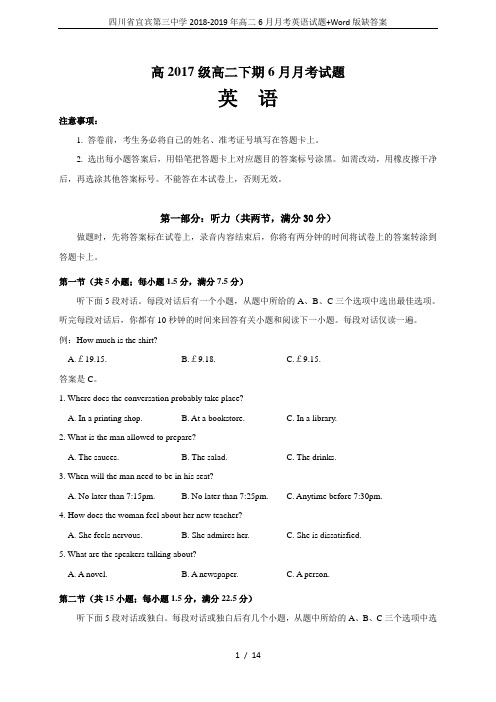
高2017级高二下期6月月考试题英语注意事项:1. 答卷前,考生务必将自己的姓名、准考证号填写在答题卡上。
2. 选出每小题答案后,用铅笔把答题卡上对应题目的答案标号涂黑。
如需改动,用橡皮擦干净后,再选涂其他答案标号。
不能答在本试卷上,否则无效。
第一部分:听力(共两节,满分30分)做题时,先将答案标在试卷上,录音内容结束后,你将有两分钟的时间将试卷上的答案转涂到答题卡上。
第一节(共5小题;每小题1.5分,满分7.5分)听下面5段对话。
每段对话后有一个小题,从题中所给的A、B、C三个选项中选出最佳选项。
听完每段对话后,你都有10秒钟的时间来回答有关小题和阅读下一小题。
每段对话仅读一遍。
例:How much is the shirt?A.£19.15.B.£9.18.C.£9.15.答案是C。
1. Where does the conversation probably take place?A. In a printing shop.B. At a bookstore.C. In a library.2. What is the man allowed to prepare?A. The sauces.B. The salad.C. The drinks.3. When will the man need to be in his seat?A. No later than 7:15pm.B. No later than 7:25pm.C. Anytime before 7:30pm.4. How does the woman feel about her new teacher?A. She feels nervous.B. She admires her.C. She is dissatisfied.5. What are the speakers talking about?A. A novel.B. A newspaper.C. A person.第二节(共15小题;每小题1.5分,满分22.5分)听下面5段对话或独白。
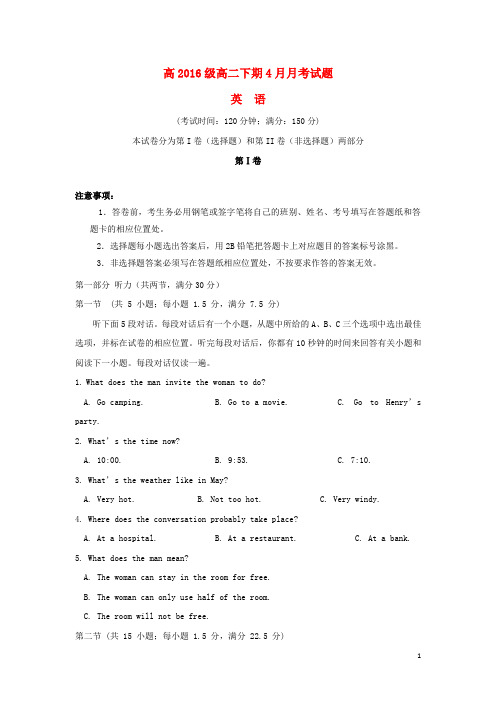
高2016级高二下期4月月考试题英语(考试时间:120分钟;满分:150分)本试卷分为第I卷(选择题)和第II卷(非选择题)两部分第Ⅰ卷注意事项:1.答卷前,考生务必用钢笔或签字笔将自己的班别、姓名、考号填写在答题纸和答题卡的相应位置处。
2.选择题每小题选出答案后,用2B铅笔把答题卡上对应题目的答案标号涂黑。
3.非选择题答案必须写在答题纸相应位置处,不按要求作答的答案无效。
第一部分听力(共两节,满分30分)第一节 (共 5 小题;每小题 1.5 分,满分 7.5 分)听下面5段对话。
每段对话后有一个小题,从题中所给的A、B、C三个选项中选出最佳选项,并标在试卷的相应位置。
听完每段对话后,你都有10秒钟的时间来回答有关小题和阅读下一小题。
每段对话仅读一遍。
1.What does the man invite the woman to do?A. Go camping.B. Go to a movie.C. Go to Henry’s party.2. What’s the time now?A. 10:00.B. 9:53.C. 7:10.3. What’s the weather like in May?A. Very hot.B. Not too hot.C. Very windy.4. Where does the conversation probably take place?A. At a hospital.B. At a restaurant.C. At a bank.5. What does the man mean?A. The woman can stay in the room for free.B. The woman can only use half of the room.C. The room will not be free.第二节 (共 15 小题;每小题 1.5 分,满分 22.5 分)听下面 5 段对话或独白。
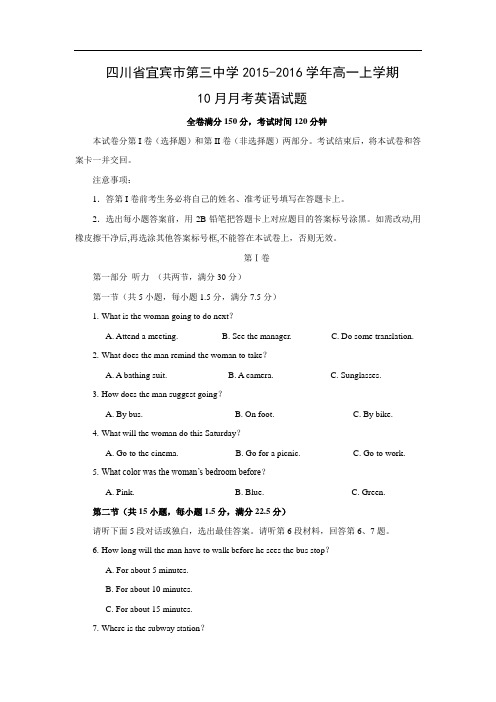
四川省宜宾市第三中学2015-2016学年高一上学期10月月考英语试题全卷满分150分,考试时间120分钟本试卷分第I卷(选择题)和第II卷(非选择题)两部分。
考试结束后,将本试卷和答案卡一并交回。
注意事项:1.答第I卷前考生务必将自己的姓名、准考证号填写在答题卡上。
2.选出每小题答案前,用2B铅笔把答题卡上对应题目的答案标号涂黑。
如需改动,用橡皮擦干净后,再选涂其他答案标号框,不能答在本试卷上,否则无效。
第Ⅰ卷第一部分听力(共两节,满分30分)第一节(共5小题,每小题1.5分,满分7.5分)1.What is the woman going to do next?A. Attend a meeting.B. See the manager.C. Do some translation.2.What does the man remind the woman to take?A. A bathing suit.B. A camera.C. Sunglasses.3.How does the man suggest going?A. By bus.B. On foot.C. By bike.4.What will the woman do this Saturday?A. Go to the cinema.B. Go for a picnic.C. Go to work.5.What color was the woman’s bedroom before?A. Pink.B. Blue.C. Green.第二节(共15小题,每小题1.5分,满分22.5分)请听下面5段对话或独白,选出最佳答案。
请听第6段材料,回答第6、7题。
6.How long will the man have to walk before he sees the bus stop?A. For about 5 minutes.B. For about 10 minutes.C. For about 15 minutes.7.Where is the subway station?A. On the right of the post office.B. On the left of the post office.C. On the left of the bus stop.请听第7段材料,回答第8、9小题。
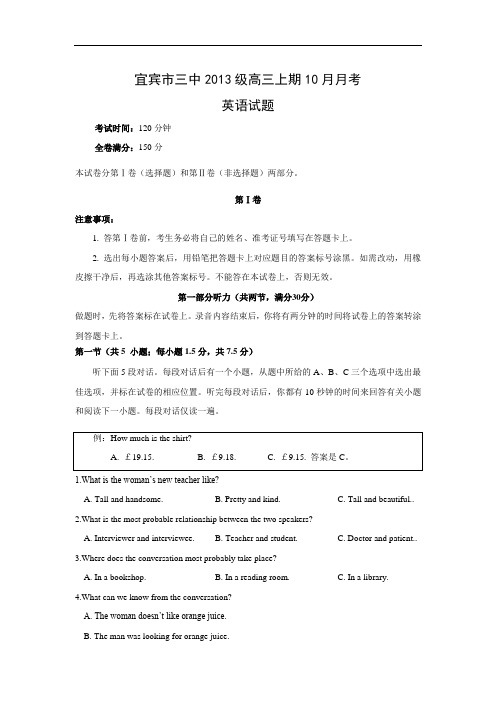
宜宾市三中2013级高三上期10月月考英语试题考试时间:120分钟全卷满分:150分本试卷分第Ⅰ卷(选择题)和第Ⅱ卷(非选择题)两部分。
第Ⅰ卷注意事项:1. 答第Ⅰ卷前,考生务必将自己的姓名、准考证号填写在答题卡上。
2. 选出每小题答案后,用铅笔把答题卡上对应题目的答案标号涂黑。
如需改动,用橡皮擦干净后,再选涂其他答案标号。
不能答在本试卷上,否则无效。
第一部分听力(共两节,满分30分)做题时,先将答案标在试卷上。
录音内容结束后,你将有两分钟的时间将试卷上的答案转涂到答题卡上。
第一节(共5 小题;每小题1.5分,共7.5分)听下面5段对话。
每段对话后有一个小题,从题中所给的A、B、C三个选项中选出最佳选项,并标在试卷的相应位置。
听完每段对话后,你都有10秒钟的时间来回答有关小题和阅读下一小题。
每段对话仅读一遍。
1.What is the woman’s new teacher like?A. Tall and handsome.B. Pretty and kind.C. Tall and beautiful..2.What is the most probable relationship between the two speakers?A. Interviewer and interviewee.B. Teacher and student.C. Doctor and patient..3.Where does the conversation most probably take place?A. In a bookshop.B. In a reading room.C. In a library.4.What can we know from the conversation?A. The woman doesn’t like orange juice.B. The man was looking for orange juice.C. The man broke the container of juice.5. How much does a pen cost?A. One dollar.B. Two dollars.C. Three dollars.第二节(共15小题;每小题1.5分,满分22.5分)听下面5段对话或独白。

宜宾市三中新2014级高二上期第一次月考英语试题(满分:150分时间:120分钟)第一卷第一部分:听力(共两节,满分30分)第一节(共5小题,每小题1.5分,满分7.5分)请听下面5段对话,选出最佳选项。
1.What will the man probably do next?A.Confirm his booking.B. Book a room.C. Go to the hotel.2.How long will Lisa stay in the National Forest Park?A.For an hour.B.For two hours.C.For three hours.3.Where does the conversation probably take place?A.At home.B.In the office.C.At the hospital4. Which city does the man think is the windiest?A.New York.B.Chicago.C.Boston.5. What are the two speakers mainly talking about?A. A family.B.A wedding.C. A dinner party 第二节(共15小题,每小题1.5分,满分22.5分)请听下面5段对话或独白,选出最佳选项。
请听第6段材料,回答第6和7题。
6. What does the woman want to drink?A.Coffee without sugar.B.Tea with sugar.C.A glass of coke.7. Why does the man suggest that the woman choose the strawberry juice?A.It’s easier to get.B.It’s sweeter.C.It’s fresher.请听第7段材料,回答第8和9题。

高2014级高二下期6月月考试题英语时间:120分钟总分:150分本试卷分第Ⅰ卷(选择题)和第Ⅱ卷(非选择题)两部分。
第Ⅰ卷注意事项:1. 答第Ⅰ卷前,考生务必将自己的姓名、准考证号填写在答题卡上。
2. 选出每小题答案后,用铅笔把答题卡上对应题目的答案标号涂黑。
如需改动,用橡皮擦干净后,再选涂其他答案标号。
不能答在本试卷上,否则无效。
第一部分听力(共两节,满分30分)做题时,先将答案标在试卷上。
录音内容结束后,你将有两分钟的时间将试卷上的答案转涂到答题卡上。
第一节(共5 小题;每小题1.5分,共7.5分)听下面5段对话。
每段对话后有一个小题,从题中所给的A、B、C三个选项中选出最佳选项,并标在试卷的相应位置。
听完每段对话后,你都有10秒钟的时间来回答有关小题和阅读下一小题。
每段对话仅读一遍。
1. How long did it take the man to finish his paper?A. Less than 75 minutes.B. Less than 100 minutes.C. Almost 150 minutes.2. Where does the man usually eat?A. At home.B. In his office.C. At a restaurant.3. Which country does the man want to know about?A. Australia.B. America.C. Canada.4. What can we learn from the conversation?A. The woman lost her way.B. The woman lost her keys.C. The woman lost her car.5. Who will pay the telephone bill?A. The man.B. The woman.C. Mary.第二节(共15题;每小题1.5分,满分22.5分)听下面5段对话或独白。
高2016级高一下期3月月考试题英语(本试卷满分150分120分钟完成)第Ⅰ卷第一部分听力(共两节,满分30分)做题时,先将答案标在试卷上。
录音内容结束后,你将有两分钟的时间将试卷上的答案转涂到答题卡上。
第一节(共5小题;每小题1.5分,满分7.5分)听下面5段对话,每段对话后有一个小题。
从题中所给的A,B,C三个选项中选出最佳选项,并标在试卷的相应位置。
听完每段对话后,你都有10秒钟的时间来回答有关小题和阅读下一小题。
每段对话仅读一遍。
1. What does the woman think about her mother ?A. Kind-hearted.B. Critical.C. Tireless.2. What are the speakers going to do probably?A. Eat breakfast.B. Walk around the town.C. Work in the restaurant.3. Why did the man come to Los Angles?A. He grew up there.B. His father worked there.C. He went to college there.4. What does the woman ask the man to do?A. Have fun on the beach.B. Throw away the garbage.C. Do community work.5. What‘s the possible relationship between the speakers?A. Husband and wife.B. Co-workers.C. Friends.第二节(共15小题;每小题1.5分,满分22 .5分)听下面5段对话或独自。
每段对话或独白后有几个小题,从题中所给的A、B、C三个选项中选出最佳选项,并标在试卷的相应位置。
听每段对话或独白前,你将有时间阅读各个小题,每小题5秒钟;听完后,各小题给出5秒钟的作答时间。
每段对话或独白读两遍。
听第6段材料,回答第6、7题。
6. What happened to the car when the girl drove it last time?A. The headlights were broken.B. The gas was used up.C. It fell into a hole.7. When does the girl promise to be home?A. At 8:30.B. At 8:00.C. At 7:30.听第7段材料,回答第8、9题。
8. What is the woman satisfied with in her career now?A. The position.B. The salary.C. The environment.9. What will the woman do for her big dream?A. Change a job.B. Stop working to study.C. Go to night school. 听第8段材料,回答第10至l2题。
l0. What will the woman bring the man tomorrow?A. A book.B. A DVD.C. A movie ticket.11. What will they check on the Internet?A. Movies being on these days.B. The price of the movie ticket.C. The show time of the movie.12. Why do they choose to watch the movie on Saturday?A. It‘s the first day when the movie is on.B. They can leave school early on that day.C. They have no classes on that day.听第9段材料,回答第13至16题。
13. What does the woman say she is doing at the beginning?A. Having a survey on family life.B. Selling life insurance.C. Having a street interview.14. What can we know about the man?A. He is unmarried.B. He has two children.C. He is ill.15. How does the woman convince the man?A. By explaining the family protection plan.B. By lowering the insurance fee.C. By providing a special offer.16. What happened at last?A. The man didn‘t buy the insurance.B. The man began to show interest in the insurance.C. He promised to think it over.听第l0段材料,回答第17至20题。
17. Where does Isobel Bowdery come from?A. America.B. France .C. South Africa.18. When did the terror attack happen?A. On Friday.B. On Saturday.C. On Sunday.19. What did she think when the shooting began?A. She must die there.B. It was part of the show.C. It was a ridiculous(荒谬的)trick.20. How did Isobel Bowdery survive?A. A man covered her head.B. She pretended to be dead.C. She hid under a chair.第二部分阅读理解(共两节,满分40分)第一节(共15小题,每小题2分,满分30分)阅读下列短文,从每题所给的四个选项(A、B、C、D)中,选出最佳选项。
AWe all know what a brain is. A doctor will tell you that the brain is the organ of the body in the head. It controls our body‘s functions, movements, emotions and thoughts. But a brain can mean so much more.A brain can also simply be a smart person. If a person is called brainy, she is smart and intelligent. If a family has many children but one of them is super smart, you could say ―She‘s the brains in the family.‖ And if you are the brains behind an organization, you are responsible for developing or organizing it.Brain trust is a group of experts who give advice. Word experts say the phrase ―brain trust‖ became popular when Franklin D. Roosevelt first ran for president in 1932. Several professors gave him advice on social and political issues facing the U.S. These professors were called his ―brain trust.‖These ways we use the word ―brain‖ all make sense. But other ways we use the word are not so easy to understand. For example, to understand the next brain expression, you first need to know the word ―drain‖. As a verb, to drain means to remove something by letting it flow away. So a brain drain may sound like a disease where the brain flows out the ears. But, a brain drain is when a countr y‘s most educated people leave their countries to live in another. The brains are, sort of, draining out of the country.However, if people are responsible for a great idea, you could say they brainstormed it. Here, brainstorm is not an act of weather. It is a process of thinking creatively about a complex topic. For example, business leaders may use brainstorming to create new products, and government leaders may brainstorm to solve problems.If people are brainwashed, it does not mean their brains are nice and clean. To brainwash means to make someone accept new beliefs by using repeated pressure in a forceful or tricky way. Keep in mind that brainwash is never used in a good way.21.According to the text, if you‘re the CEO of Bai Du you can be called_______ .A.the organ of Bai Du B.the brain drain of Bai DuC.the brains behind Bai Du D.Bai Du‘s brain trust22.Why did Roosevelt successfully win the election according to the passage?A.Because he was the brain trust of Americans.B.Because he got his brain trust.C.Because he was smart at giving advice.D.Because word experts say he is ―the brain trust‖.23.Which of the following expressions is always used in an impolite way?A.Brainstorm B.Brain trustC.Brainwash D.Brain drain24.What‘s the main idea of this article?A.The origin of the word ―brain‖.B.The word ―brain‖ and its stories.C.The brain is an important organ of the body.D.How to use your brain more effectively.BOne Halloween a little boy and his friend went out for a fun night of trick-or-treating. At first everything was great. They were getting lots of candy as they went from house to house, but then they saw a house which they hadn't been to before. It was a very spooky(阴森森的) house. Being young and brave, they decided to go up to the door and knock. After all, scary houses might have the best candy!As they walked up the long winding path, they saw things that chilled(使恐惧)them to the bone! They heard sounds that frightened them. Maybe they should turn back.But the little boys, being very brave, just wanted to see what was in that house. so they went on, not deterred by the things they heard or saw. As they slowly made their way up to the door, they imagined what might be inside. Maybe it would be a witch or maybe a ghost!After knocking several times, the door slowly creaked:(嗄吱作响) open. To their surprise, a monster(怪物) slowly came out to greet them. They were .so scared that they couldn't move! What could they do? Then the little boy had an idea. He said, "Trick or treat!" Then the big scary monster, much to the kids' surprise, reached over and brought out a huge bowl of the best candies they had never seen. Wow, the kids thought, this was great!It turned out that the house was decorated for Hallow-en; and the big scary monster was just wearing a costume, just like the kids. Since they were the only kids, and were brave enough to go to the scary house, they could take as much candy as they wanted.25. This passage is mainly about .A. a funny Halloween storyB. two brave kidsC. a spooky houseD. the custom of Halloween26. Why do you think the kids were brave enough to enter the strange house?A. Because they were prepared for what would come to the door.B. Because they expected to meet other trick-or-treating inside.C. Because they were curious about what was in the house.D. Because they were anxious to get more candy.27. According to the passage, we can see that .A. nobody had ever been to the houseB. the owner of the house was creativeC. a monster lived in the houseD. there was a witch in the house28. It can be inferred from the passage that .A. the monster was afraid of the phrase "trick or treat"B. the two kids were also wearing costumesC. not all families prepared candy for brave kidsD. some other children had been to the house before the two kidsCI first came across the concept of pay-what-you-can cafes last summer in Boone, N.C., where I ate at F.A.R.M (Feed All Regardless of Means) Café. You can volunteer to earn your meal, pay the suggested price($10) or less, or you can overpay—paying it forward for a future customer‘s meal. My only regret after eating there was not having a chance to give my time. So as soon as Healthy World Café opened in York in April, I signed up for a volunteer shift(轮班).F.A.R.M and Healthy World are part of a growing trend of community cafés. In 2003, Denise Cerreta opened the first in Salt Lake City. Cerreta now runs the One World Everybody Eats Foundation, helping others copy her pay-what-you can model.―I think the community café is truly a hand up, not a hand out,‖ Cerreta said. She acknowledged that soup kitchens(施粥所) have a place in society, but people typicall y don‘t feel good about going there.―One of the values of the community café is that we have another approach,‖ she said. ―Everyone eats here, no one needs to know whether you volunteered, overpaid or underpaid.‖The successful cafés not only solve hunger and food insecurity but also become necessary parts of their neighborhood –whether it‘s a place to learn skills or hear live music. Some teach cooking to seniors; some offer free used books. Eating or working there is a reminder that we are all in this world together.My 10 am---1pm shift at World-Healthy-Café began with the café manager – one of the two paid staff members. Our volunteer crew wasn‘t the most orderly, but we managed to prepare and serve meals with a lot of laughs in between. At the end of my shift, I ordered my earned meal at the counter, together with other volunteers. After lunch, I walked out the door, with a handful of new friends, music in my head and a satisfied belly and heart.29. What did the author do at F.A.R.M Café last summer?A. She enjoyed a meal.B. She ate free of charge.C. She overpaid for the food.D. She worked as a volunteer.30. What is the advantage of community cafés compared with soup kitchens?A. People can have free food.B. People can maintain their dignity.C. People can stay as long as they like.D. People can find their places in society.31. Why are community cafés becoming popular in the neighborhoods?A. They bring people true friendships.B. They help to bring people together.C. They create a lot of job opportunities.D. They support local economic development.32. How did the author feel about working at Healthy World Café?A. It paid well.B. It changed her.C. It was beneficial.D. It was easy for her.DAs you grow rapidly through your teenage years, you will experience a lot of changes. The changes may seem difficult and they may seem to happen quickly. Don’t panic(恐慌)!You will deal successfully with them!You are a young adult now!With more responsibility,you will find more freedom to make your own choices. This is a time to be well informed(知晓)about your choices so that you can make healthy balanced decisions that will help shape your future. You may already know your career path or you may have no idea at all what you want to do. Both situations are fine!Work hard and the right opportunity will present(展现)itself to you.Young adulthood means greater freedom and more choices. You will probably want to be independent. But try not to shut your family out of your life. You should learn to think of others even though you are old enough to look after yourself. Your family have been with you since you came into this world.It is also perfectly natural in this time for you to spend more time with your friends than your family. Choose your friends wisely. A true friend will stand by you no matter what happens. This period is part of the life cycle. There are some people who will be with you throughout life's journey and there will be some people with whom you part(分离)and go separate ways. Leaving school can be hard. The reality is that you may not ever see all of your classmates again.You are a young adult. It is your life. No one can live it for you. The choices that you makefrom now on will be your choices. So making the right choices will be important to you. Life is for living. Enjoy your life wisely!33. The best title for this passage would be ________.A. The Choices in LifeB. The Key to SuccessC. Say Goodbye to the PastD. Becoming a Young Adult34.Who do the underlined words “some people” (Paragraph 4) probably mean?A. your parentsB. your classmatesC. true friends D.your relatives35. Who is the passage mainly intended for?A. Teenagers.B. Teachers.C. Young parentsD. Adults.第二节(共5小题,每小题2分,满分10分)根据短文内容,从短文后的选项中选出能填入空白处的最佳选项,选项中有两项为多余选项。